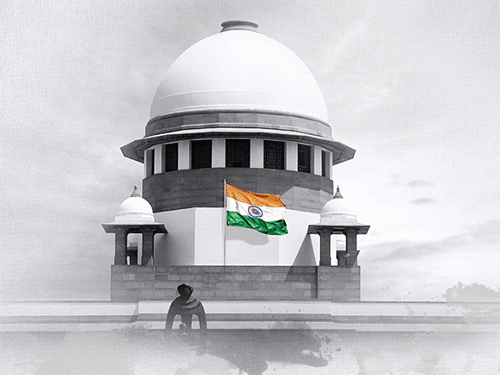India News Get -NationalPrivate property; Updated Supreme Court verdict under Section 39(B) | DY Chandrachud
The court was hearing 16 petitions, including the main petition filed by the Mumbai-based Property Owners Association (POA) in 1992.
Can the government acquire private property for public good under Article 39(B) of the Constitution? On Tuesday, a panel of nine judges of the Supreme Court overturned its own decision rendered in 1978 (45 years ago).
A nine-judge bench headed by CJI DY Chandrachud delivered the verdict with a majority of 7:2. The court said, “Any private property cannot be termed as community property. The government can only consider certain resources as community resources and use them for the benefit of the people.
The court rejected Justice Krishna Iyer’s 1978 ruling, which said: “All private properties can be taken over by state governments.” » CJI said – The old decision was inspired by a particular economic and socialist ideology. However, state governments can claim community-held physical resources for the public good.
CJI DY Chandrachud, Justice Hrishikesh Roy, Justice JB Pardiwala, Justice Manoj Mishra, Justice Rajesh Bindal, Justice SC Sharma and Justice Augustine George Masih delivered the majority verdict. Justice BV Nagarathna partially disagreed with the majority decision, while Justice Sudhanshu Dhulia disagreed on all aspects.
What was asked in the petition
The court was hearing 16 petitions, including the main petition filed by the Mumbai-based Property Owners Association (POA) in 1992. The POA objected to Chapter VIII-A of the Maharashtra Housing and Regional Development Act (MHADA ).
This chapter, added in 1986, authorizes the state government to acquire dilapidated buildings and their land if 70% of its owners request it. This amendment was opposed by the Property Owners Association.
Solicitor General Tushar Mehta, appearing for the Maharashtra government, had said that the MHADA provisions were protected under Article 31C of the Constitution, which was inserted by the 25th Amendment Act, 1971 with the aim of protecting laws giving effect to certain directive principles of the State. Politics (DPSP).
What is the law of Maharashtra government?
The state government levies a tax on people living in these houses under the Maharashtra Housing and Area Development Authority (MHADA) Act, 1976 for repairing the buildings. This amount is paid to the Mumbai Building Repair and Reconstruction Board (MBRRB), which repairs these buildings.
The MHADA Act was amended in 1986 by introducing the requirement under Section 39(B). Section 1A was added, which covered the execution of projects to acquire land and buildings so that they could be transferred to people in need.
Chapter VIII-A of the amended Maharashtra Housing and Area Development Authority Act (MHADA) provides that the State government can acquire occupied buildings and the land on which they are constructed, if 70 per cent of the people living therein request it.
The court had reserved the decision on May 1.
A nine-judge bench headed by CJI DY Chandrachud had reserved the verdict on May 1 after hearing arguments from several lawyers, including attorney general R Venkataramani and solicitor general Tushar Mehta.
——————————-
related to the Supreme Court…
Supreme Court upholds validity of UP Madrasa Act, Allahabad High Court decision set aside
The Supreme Court has delivered its verdict on the UP Madrasa Board of Education Act, 2004. The court upheld the validity of the Madrasa Act. The decision of the High Court is thus suspended. Earlier, on April 5, 2024, the Supreme Court had stayed the Allahabad High Court’s decision declaring the Madarsa Act unconstitutional. A response was also sought from the central and UP governments. …
CJI said: Gave bail to A-Arnab to Z-Zubair, this is my philosophy
Chief Justice of India (CJI) DY Chandrachud said the good or bad of a case can be very different from what is shown in the media. I gave bail to everyone from A to Z (from Arnab Goswami to Zubair). That’s my philosophy. Bail is the rule and prison is the exception, this principle must be followed as a priority. …

